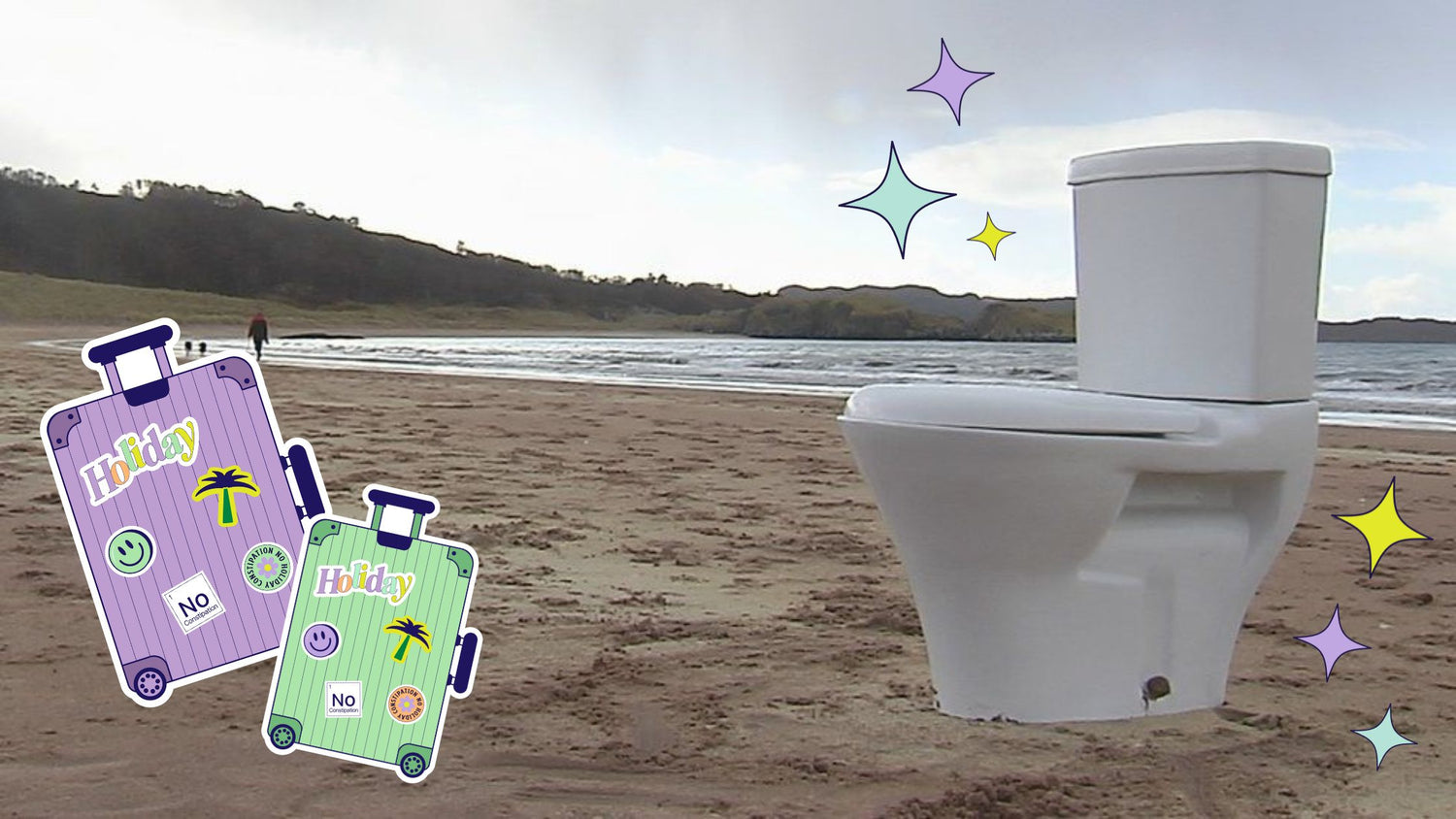Have you booked a holiday in the near future? If so, you might already be thinking about what clothes you’re going to pack in your suitcase, what foods you’re going to eat, and which activities you would like to try whilst you’re away.
As exciting as travelling to new places can be, it can lead to digestive issues for many people. Going on holiday often means a change in routine, new foods, and disruption to your toilet regularity, and many people experience constipation on holiday for this reason.
Maintaining regular bowel habits when you’re away can be a little more difficult than it is when you’re in the comfort of your own home. However, it’s not impossible. There are lots of different strategies you can adopt on holiday to keep constipation at bay, and even more daily habits you can implement to beat constipation in the long term.
In this article, we’re going to discuss toilet regularity, how being on holiday can impact your bowels, and the most common signs of reduced regularity to be aware of. We will finish off with covering some tips on how you can stay regular on holiday and relieve constipation naturally.
What is Regularity?
Bowel regularity refers to the consistent and predictable pattern of your bowel movements. It comprises a few different elements, including the frequency of your bowel movements, the texture and form of the stools you’re passing, and how easy it is for you to pass them when you do have a bowel movement.
Most people go to the toilet every day, every other day, or three times a week. Anything less than this may indicate constipation or an underlying digestive health issue. Those going to the toilet multiple times a day may be dealing with a chronic digestive issue like Crohn’s disease, ulcerative colitis, or coeliac disease.
Why Do Holidays Affect Regularity?
Holidays and travelling can cause digestive issues and affect your toilet regularity for a number of reasons.
Firstly, going on holiday often involves travelling for several hours to get to your destination. When travelling, you are largely sedentary, which can slow down the movement of food through your gastrointestinal tract (known as mobility). As a result, you are more likely to experience, floating on holiday than you are you are up and about in your everyday life.
Depending on the type of holiday you go on, you might also find that you remain secondary for its duration. This can exacerbate the bloating effects of your initial travelling and extend the number of days in which you experience holiday bloat.
For example, if you’re on a relaxing sunbathing holiday where you’re staying at a hotel that has an all-inclusive buffet of junk foods and you’re moving very little during the day, you’re more likely to get bloated than if you take a city break, where you’re walking around all day and eating out at healthier restaurants.
At the same time, travelling and being abroad on holiday often comes along with a change in diet. Most people find that they consume more starchy, fatty, and sugary foods when they go on holiday. These types of foods are known to increase the risk of digestive issues, the most common of which are bloating, gas, constipation, and stomach aches.
Although holidays are supposed to be relaxing, you might get stressed about delayed flights, navigating a new city, or finding the best place to eat. The small amount of stress that you can experience whilst vacationing can negatively impact your digestion, slow your mobility, and increase holiday bloat.
What Are the Signs You Have Become Less Regular?
There are a few important signs to look out for that indicate reduced regularity. Recognising the signs of constipation and fewer toilet trips is important for taking action quickly to resolve the issue.
Here are some of the most common symptoms of bowel irregularity and subsequent constipation:
- Infrequent bowel movements or a significant reduction in the number of bowel movements you have each week compared to normal
- Bloating
- Hard or lumpy stools that are difficult to pass
- Straining to pass stools and finding bowel movements uncomfortable
- A feeling that you haven’t emptied your bowels properly when you’ve been to the toilet
- Abdominal discomfort and cramps
- The need to take a laxative to have a bowel movement
If you’re experiencing quite a few of these symptoms, it’s likely that you’re dealing with constipation. Thankfully, there are lots of different things you can do to tackle constipation, and we have covered them below!
How Can I Stay Regular on Holiday?
Staying regular on holiday enables you to avoid unwanted digestive issues and constipation so you can enjoy your time away from home as much as possible. Try the following strategies to ensure bowel regularity when you’re on holiday. These strategies will help to beat constipation in the long term, too.
Get yourself a natural laxative supplement
You can get over-the-counter laxatives from the pharmacy that contain synthetic substances that get your bowels moving. However, these synthetic laxatives don’t work well for everybody, and many people respond better to natural laxatives.
A Dose For Blocked Bellies is a natural laxative that contains six herbs, including aloe vera, ginger root, and fennel seed extracts and magnesium citrate. These herbal extracts are known to promote better digestive health and reduce the risk of symptoms like constipation and abdominal pains.
Packing our natural supplement in your travel bag means you’ll have a quick fix to your digestive issues if you get constipated whilst you’re on holiday.
We recommend taking two capsules of A Dose For Blocked Bellies just before you go to bed, but you can always increase or decrease the number of capsules you take depending on how your body responds.
Pack some probiotics in your travel bag
Probiotics refer to beneficial bacteria that reside naturally in the gut, but you can also take them in the form of a supplement or find them in various foods. Probiotic bacteria are abundant in fermented foods like yogurt, sauerkraut, tofu, tempeh, kefir, and miso.
Probiotic bacteria help with the production of vitamin B12, vitamin K, and short-chain fatty acids (SCFAs). They also ferment certain carbohydrates in your diet to help break them down into absorbable nutrients.
Because of their key roles in metabolism, probiotic bacteria can help to prevent constipation and minimise bloating. For this reason, they are a must when you’re on holiday.
It might be difficult to find lots of probiotic-rich foods when you’re on holiday. You’re not likely to find pickles and sauerkraut at a breakfast buffet! So, it’s best to pack a high-quality probiotic supplement, such as A Dose For Bloating, in your suitcase, ready to take each day when you’re away from home.
Stay hydrated when you’re on holiday, especially if you’re somewhere hot
You absolutely need to keep your body hydrated when you’re away on holiday, especially if you’re somewhere hot and humid. Sweating causes you to lose more water and electrolytes, and it’s important to replace this lost water in order to prevent dehydration.
Drink at least eight glasses of water each day, and even more than this if you’ve been sweating a lot or exercising a lot whilst you’re on holiday. Even if you’re drinking smoothies or alcoholic beverages, you should still aim for plenty of water to ensure you’re getting enough fluids to support your body’s physiological and metabolic functions.
In fact, you might need to drink more water if you’re consuming a lot of alcohol whilst you’re abroad. Alcohol is a diuretic, which means it increases your urinary output. In turn, it can cause you to become dehydrated if you don’t replace the fluid you’re losing.
If you’re unlucky enough to catch traveller’s diarrhoea when you’re abroad, you will need to drink more water than usual to replace the fluids you’re losing in your watery stools. In severe cases, you may need to go to your local hospital for intravenous (IV) fluid and electrolytes to restore them to optimal levels within your body.
Try and maintain some sort of routine
It’s much easier said than done but try and stick to a toilet routine that enables you to stay regular. If you usually go to the toilet each morning, try and do the same whilst you’re away on holiday.
Sticking to a routine similar to your usual one at home will help your digestion and enable you to maintain regularity, even if your day-to-day routine is completely different from your usual at-home activities.
Relax as much as possible, but also keep moving
Your parasympathetic nervous system is most active when you’re relaxed, and it’s colloquially known as the ‘rest and digest’ branch of the autonomic nervous system. When your parasympathetic nervous system is dominant, the blood flow to your digestive system is rich, and your digestion is efficient. So, you’re much less likely to experience digestive issues when you’re feeling chilled out.
For this reason, sitting back and relaxing whilst you’re on holiday is key for staying regular and avoiding constipation. Relaxing your mind and avoiding the stress of your daily life, you can ensure optimal digestion and great toilet regularity.
However, we’re going to contradict ourselves here because we also recommend that you keep your body moving. Even though exercise isn’t relaxing as such, and it can actually reduce your parasympathetic activity, it’s also a great way to maintain bowel regularity. We recommend gentler forms of exercise whilst you’re on holiday to avoid stressing the body too much and causing you to find it hard to relax.
Go for walks to explore the local town or do some morning yoga in the sun. Practicing gentle forms of exercise will help to keep your body moving without negatively impacting your digestion.
Pack high-fibre snacks in your travel bag
You’re allowed to take dry foods with you on a plane, so if you’re going abroad, consider packing some high-fibre snacks into your suitcase. You can take these snacks with you when you’re out for long day trips on your holiday.
Fibre fuels the probiotic bacteria in your gut, boosting metabolism and digestion. It also helps to soften the stool, making it easier to pass and preventing constipation.
High-fibre snacks include oat crackers, nuts, and trail mix. Buy some of these snacks before you go away to pack them into your bag and provide healthy snacks for your trip. You can also buy fresh fruits and vegetable sticks whilst you’re away for extra micronutrients and fibre.
Most people indulge in junk foods and high-fat desserts when they’re on holiday. There is absolutely nothing wrong with indulging, but these foods contain very little fibre and increase the risk of constipation and bloating. Choosing high-fibre snacks can, therefore, be particularly helpful to eat whilst you’re abroad because you might struggle to consume fibre elsewhere in your diet during this time.
Eat slowly and listen to your hunger cues
It’s important to practice mindful eating when you’re on holiday. Chewing your food slowly and paying attention to every bite enables you to notice when you’re getting full and avoid overeating.
Chewing your food starts the process of mechanical and chemical digestion, which is essential for healthy overall digestion. Taking time to chew your food multiple times before swallowing it sets your body up for efficient digestion in the lower gastrointestinal tract (the intestines) to reduce the risk of bloating, gas, and constipation.
Pay attention to your hunger and fullness cues so you can stop eating when you start to feel satisfied. Avoiding overeating will help to promote more efficient digestion and prevent you from feeling bloated and uncomfortable. As tempting as it might be to go crazy and indulge in all of your favourite treats whilst you’re on holiday, it’s also important to listen to your body and the hunger cues it’s giving you.









